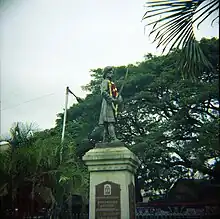Gowda (also known as Gauda, Goud, Gouda or Gonda[1][2]) is a surname native to Karnataka state of India. It is mainly found among the Vokkaligas and Kurubas in South Karnataka, Halumatha (Kurubas) and the Lingayats in north Karnataka.[3][4] It is also used by other communities like Namadhari Naiks,[5] Billavas.[6] Gowda was originally an honorific used by the administrative head of a village. Typically, such a head owned land and held political and social sway in the village.[7] Among Kurubas, it was used to refer to the head of the community.[8][9]
Etymology
According to historian Suryanath U. Kamath, the word Gowda derives from Gavunda.[10] The German Indologist Gustav Oppert opined that the root of ‘Gowda’ is a Dravidian word meaning "mountain".[11] The term Gowda and its archaic forms in Old Kannada such as Gamunda, Gavunda, Gavuda, Gonda, appear frequently in the inscriptions of Karnataka. The Epigraphia Carnatica is replete with references to land grants, donations to temples, hero-stones (Veeragallu), stone edicts and copper plates dating back to the age of the Western Ganga Dynasty (est. 350 CE) and earlier.[12] The Gavundas were landlords that collected taxes and rendered military service to the Kings.[13] Noboru Karashima says the Gavundas had functions corresponding to that of the Chola Vellala Nattars.[14] While the majority of the gavundas were derived from the Vokkaligas; by the 10th century, the term gavunda also came to denote chiefship of a community or group and was adopted by the heads of other communities assimilated into the early medieval state.[9]
Notable people with surname Gowda

Notable people with the surname Gowda:
Agriculture
- M. H. Marigowda, Indian horticulturist
Film
- Akshara Gowda (born 1991), Indian actress from Karnataka
- Ambareesh (born 1952 as Huche Gowda Amarnath) Indian politician and actor from Karnataka
- Bhavya Gowda (born 1983), Indian model from Karnataka
- Ere Gowda, Indian Kannada film director from Karnataka
- Jaggesh (born 1963 as Eshwar Gowda), Indian Kannada actor from Karnataka
- K. C. N. Gowda (c. 1928–2012), Indian Kannada film producer and film distributor
- Pallavi Gowda (born 1993), Indian actress from Karnataka
- Ravishankar Gowda, Indian actor from Karnataka
- Sheela Gowda (born 1957), Indian artist from Karnataka
- Yash (born Naveen Kumar Gowda), Indian actor from Karnataka
Historical Figures and Rulers
- Junje Gowda, Founder of Male Mahadeshwara Temple
- Kempe Gowda I (1510–1569), Founder of Bengaluru & feudatory ruler of the Vijayanagara Empire, now Karnataka, India
Law
- Venkate Gopala Gowda (born 1951), Indian Supreme court judge
Literature
- Javare Gowda (1915–2016), Indian Kannada author
- H. L. Nage Gowda (1915–2005), Indian Kannada folklorist and author
- Shilpi Somaya Gowda (born 1970), Canadian novelist
Politics
- Siddaramaiah (born as Siddarame Gowda in 1947), Indian politician from Karnataka
- D. B. Chandre Gowda (born 1936), Indian politician from Karnataka
- D. V. Sadananda Gowda (born 1953), Indian politician from Karnataka
- H. D. Deve Gowda (born 1933), former Prime Minister of India
- Krishna Byre Gowda (born 1973), Indian politician from Karnataka
- M. J. Appaji Gowda (died 2020), Indian politician
- Maritibbe Gowda, Karnataka politician
- N. H. Gouda, (1938–1992), Indian politician from Karnataka
- Narayana Gowda, Indian politician from Karnataka
- Rajeev Gowda, Indian politician and academic from Karnataka
- Ramachandra Gowda, Indian politician from Karnataka
- Sadananda Gowda, Indian politician from Karnataka
- Shantaveri Gopala Gowda (1923–1972), Indian politician from Karnataka
- Tejashwini Gowda (born 1966), Indian politician from Karnataka
- K. Venkatagiri Gowda (born 1923), Indian Economist & politician from Karnataka
Sports
- Girisha Nagarajegowda (born 1988), Indian Paralympic athlete known as Girish N. Gowda
- Vikas Gowda (born 1983), Indian athlete
Others
- K. Chidananda Gowda, Indian computer scientist
- Tulsi Gowda, Indian environmentalist
See also
References
- ↑ Census of India, 1961, Volume 11, Part 6, Issue 23. India: Office of the Registrar, General Manager of Publications. 1976. p. 10.
...Gowda (also spoken as Gonda colloquially)...
- ↑ Ramananda Chatterjee (1930). The Modern Review. Vol. 47. India: Prabasi Press Private, Limited. p. 80.
- ↑ D K Kulkarni (1992). "Tenants movements in Uttara Kannada district and the Kagodu Satyagraha". Peasant movements in Karnataka since 1900 their nature and results (PDF). Karnatak University / Shodhganga. p. 80. Retrieved 24 October 2016.
Gowdas, literary means a village headman usually from Vokkaliga community in Southern district of Karnataka and Lingayat in Northern part
- ↑ George Matthew (1984). "Shift in Indian Politics: 1983 Elections in Andhra Pradesh and Karnataka". Concept. Retrieved 3 November 2016.
- ↑ The Mysore Tribes and Castles. Mittal Publications.
- ↑ A. S. Seetharamu (1997). Literacy Campaigns in India. APH Publishing. p. 131. ISBN 978-81-7024-814-9.
- ↑ K. T. Margaret, ed. (1999). The Open Classroom: A Journey Through Education. Orient Blackswan. p. 131. ISBN 978-81-250-1669-4.
- ↑ . Page:Castes and Tribes of Southern India, Volume 4.djvu – via Wikisource.
According to Mr. Stuart, "each community of Kurubas, residing in a group of villages, has a headman or Gaudu. He acts the part of pūjāri or priest in all their ceremonies, presides over their tribal meetings, and settles disputes.
- 1 2 Malini Adiga 1997, pp. 145, 147.
- ↑ Kamath, Suryanath U.; Naik, R.A (1983). Gazetteer of India Government of Karnataka, Karnataka State Gazetteer Part II. Bangalore: Parishree Printers. p. 243-244.: ”Villages had gramakuta or gavunda (gauda), the village headman. He had under him the village militia^ later called as talaras and tolls.”
- ↑ Kumar Suresh Singh; Anthropological Survey of India (2002). People of India. Anthropological Survey of India. p. 408. ISBN 978-81-85938-99-8.
- ↑ Benjamin Lewis Rice, R.Narasimhacharya (1894–1905). Epigraphia Carnatica. Government Central Press, Bangalore & Mysore.
- ↑ Malini Adiga 1997, p. 139.
- ↑ Karashima, Noboru (2014). A Concise History of South India: Issues and Interpretations. India: Oxford University Press. p. 144-145. ISBN 978-0198099772.:”They are, for example, Gavunda chiefs and heggade revenue officers vis-à-vis the Chola Vellala nattars; kalnad military tenure vis-à-vis padai-parru or parigraham tenure in the Chola state”